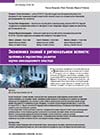Implementation of the “Smart Specialization” Concept in Russian Regions Bordering China
DOI: 10.33917/es-1.199.2025.80-87
The article dwells on the issues of implementing the strategy of sustainable innovative development of Russian regions as a basis for creating competitive advantages of territories and improving the quality of the population life. The work, in relation to the regions of Russia bordering China, describes the concept of “smart specialization” — a strategy for identifying priority areas for the regions development and enhancing specific types of economic activity, which involves exploiting the potential of their innovative growth, choosing a unique path with a focus on future development. The authors focus on the industry specialization of regions as a basis for determining directions of «smart specialization». As a result of the study, the authors propose the models of crossborder cooperation for the regions of Russia and China based on the «smart specialization» of the above regions.
References:
1. Voronov A.S. Upravlenie ustoychivym innovatsionnym razvitiem regional’nykh sotsial’no-ekonomicheskikh sistem: Monografiya [Management of Sustainable Innovative Development of Regional Socio-Economic Systems]. Monograph. Moscow, YuNITI-DANA, 2022, 287 p.
2. Aver’yanov M.A., Evtushenko S.N., Zhivaykin A.L., Kochetova E.Yu. Strategicheskoe planirovanie v usloviyakh vyzovov tsifrovoy transformatsii [Strategic Planning in the Face of Digital Transformation Challenges]. Ekonomicheskie strategii, 2024, no 1, pp. 54–61, DOI: https://doi.org/10.33917/es-1.193.2024.54-61
3. Orlova L.N. Osnovnye printsipy i podkhody k upravleniyu ustoychivym innovatsionnym razvitiem ekonomicheskikh system [Basic Principles and Approaches to Managing Sustainable Innovative Development of Economic Systems]. Menedzhment v Rossii i za rubezhom, 2016, no 3, pp. 3–9.
4. Alekseev A.V. Vyyavlenie klyuchevykh spetsializatsiy regionov i klasternykh struktur v usloviyakh perekhoda k kontseptsii “umnoy spetsializatsii” (na primere Baykal’skogo makroregiona) [Identification of Key Specializations of Regions and Cluster Structures in the Context of the Transition to the Concept of “Smart Specialization” (using the Example of the Baikal Macroregion)]. Estestvenno-gumanitarnye issledovaniya, 2021, no 38(6), pp. 34–39.
5. Tagirov K.T., Glushchenko A.V., Dovgan’ E.A. Strategiya “umnoy spetsializatsii” regionov kak faktor innovatsionnogo razvitiya [The Strategy of “Smart Specialization” of Regions as a Factor of Innovative Development]. Gosudarstvennoe i munitsipal’noe upravlenie. Uchenye zapiski, 2023, no 1, pp. 152–156.
6. Kroll H. Efforts to implement smart specialization in practice — Leading unlike horses to the water. European Planning Studies, 2015, no 23(10), pp. 2079–2098, DOI: 10.1080/09654313.2014.1003036
7. Sotarauta M. Smart specialization and place leadership: Dreaming about shared visions, falling into policy traps? Regional Studies, Regional Science, 2018, no 5(1), pp. 190–203, DOI: 10.1080/21681376.2018.1480902





